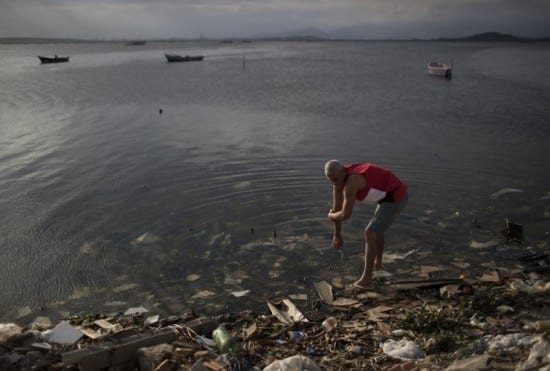On a cool December night in Paris, at an awards ceremony in the city’s 3rd arrondissement, Eduardo Paes, the mayor of Rio de Janeiro, took the stage to thunderous applause from an audience full of his fellow mayors from around the world. Paes’ voiced boomed as he stressed the importance of cities leading the fight against climate change — as chair of the C40 network, a group representing 80 world cities working together to combat the devastating effects of climate change, Paes is a prominent evangelist of the local leader’s power to champion sustainability at home.
“It is choices taken by mayors in the next five years that will determine whether or not the world is on a high or low emissions pathway,” Paes said. “But what better hands could the world be in — cities have continued to innovate.”
Onstage, Paes exuded charm as he guided the awards ceremony from start to finish. After the ceremony, however, Paes’ sunny disposition quickly faded when he was approached by a group of reporters hoping to question the mayor about his city’s role in hosting the 2016 Olympic Games. A gruff Paes rebuffed all requests for comment, striding through the gaggle of reporters with few words. The mayor, it seemed, was less interested in discussing his own local policy than extolling the grandiose benefits of cities writ large.
Such is the inherent conflict embodied by Paes and his role as an international leader in sustainability and climate change. As Paes’ accepts awards, chairs networks, and gives TED talks about sustainability, he oversees a city where, for decades, raw waste has polluted public water and gridlocked traffic has spewed pollution into the air. The 2016 Olympics were billed as “Green Games for a Blue Planet” during the bidding process, aimed at catalyzing the city’s transition into a 21st-century haven of sustainability both environmental and social. Instead, the leadup to the games has become somewhat of a nightmare for organizers, as venues are contaminated with garbage, transit projects remain unfinished, and the state of Rio is in the midst of a financial crisis.
So how did an international environmental champion fail to meet the promises of a sustainable Rio in time for the city’s biggest international event in decades?

It’s impossible to separate the Rio Olympics from sustainability — the two were entwined before the games were an official reality. In their bid to play host, Rio officials insisted the event would bring much-needed sustainable development to the city, which for residents would mean both new urban infrastructure and new environmental and social initiatives. In short, the games were Rio’s ticket to taking a city plagued with a myriad of social and environmental ills and rectifying those wrongs.
In 2009, the Rio 2016 Organizing Committee submitted the city’s official application for hosting the Olympic Games. Throughout the hundreds of pages of planning documents, sustainability emerges as a consistent theme. It appears in discussions of long-term planning, in an outline of the games’ core principles, in examinations of where athletes would stay and how food would be sourced for the event. Based on an analysis of Rio’s bid documents conducted by urban geographer Christopher Gaffney, the word “environment” and its derivatives are the second most used terms in the Rio Olympic bid, just behind “security.” The word “sustainability” was used three times more often than “education,” eleven times more than “citizen.”
The foundation of Rio’s environmental ambitions were the legacy plans — more than 25 projects that would overhaul some of the city’s most downtrodden areas. Organizers pledged to revitalize the port area, one of the oldest sections of the city that had become both rundown and crime-ridden. They promised to build a robust public transportation system, complete with a rapid bus transit line and a 10-mile addition to the city’s pre-existing subway. And, perhaps most ambitious, there was the promise to clean up the Guanabara Bay. Almost 9 million people live in the watershed that feeds the bay and for decades they have dumped trash and untreated sewage into rivers and streams that eventually make their way to the Guanabara.
But for the Olympics, Brazilian officials promised, that would all change; they would capture the raw sewage, and treat it, and the Guanabara Bay — once designated as one of the seven natural wonders of the world — would be clean once again.

Eduardo Paes has the easy charm of someone who was always destined for a life in politics. Born in Rio, and raised in the richer parts of the city, he is tall, with dark hair and a handsome face — the kind of looks that likely helped launch his brief career as an extra in Brazilian soap operas before he decided to trade show business for the city’s most prestigious law school. After law school, Paes transitioned easily into politics, climbing from city councilman to sub-mayor of the Barra de Tijuca district of Rio to congressmen, all while changing his political party a total of five times.
In 2008, when he was just 38 years old, Paes won the mayorship in a hotly contested election, narrowly beating his opponent, Green Party leader Fernando Gabeira, 51-49. In previous elections, Gabeira had success running as an explicitly pro-environmental candidate: In 1994, he was elected to Congress running on an “ecological and economical” platform, campaigning with recycled fliers and a bicycle.
Paes, in contrast, offered Cariocans (the nickname for residents of Rio) a more straight-and-narrow approach to governance. Paes’ campaign was largely funded by the real estate developers from his old political stomping grounds in the Barra de Tijuca, one of the newest and most developed neighborhoods in Rio. According to Renato Cosentino, a researcher associated with Rio’s Federal University, at least one third of the donations to Paes’ party during the campaign came from real estate and engineering companies.
Paes had been in office just eight months when Rio received news that would change the course of its history: It had been selected as the first South American city to host an Olympics, beating out top contenders like Chicago (backed by a newly-elected Barack Obama), Tokyo, and Madrid. The city, and the country, which was in the midst of an economic boom, was euphoric. Minutes after the announcement, Paes, then just 39 years old, tweeted, “Our city deserves this present. Viva Rio.”
With the mayorship, Paes inherited both the games and the promises of a more sustainable Rio that came with them. And while his opponent had the more impressive environmental pedigree, Paes had served as Rio’s sports secretary and was a part of the team that helped craft Rio’s Olympic bid. And so, as mayor, Paes set about transforming Rio de Janiero into the modern, 21st-century kind of smart city that he outlined in TED Talks and op-eds. He proposed a bus rapid transit line that would open up public transportation for parts of the city that had been underserved by existing infrastructure. He promised to modernize Rio’s slums, or favelas, by 2020. He created a new Center of Operations for the city, designed in conjunction wit I.B.M., which uses technology to connect public workers — police, firefighters, medical responders — to events happening in the city in real-time. And he replaced the city’s old landfill with a new, state-of-the-artwaste treatment center, aimed at helping curb the pollution in the Guanabara Bay.
As mayor, Paes also initiated important steps to make Rio more resilient in the face of climate change. Under Paes, Rio became the first city to be compliant with the Compact of Mayors, which requires cities to complete an inventory of their greenhouse gas emissions and set targets for emissions reductions. It also became the first Brazilian city to complete a study of its climate vulnerabilities, and in 2011, passed a municipal bill that both mandated consistent greenhouse gas reporting and emission cuts of 20 percent by 2020.
In 2012, four years after he first ascended to the top of Rio’s city government, Paes continued to ride the wave of hope and optimism accompanying the two mega events — the 2014 World Cup and the 2016 Olympics — that would soon be coming to Brazil. Paes comfortably won reelection, carrying 65 percent of the vote. With four years to go until Rio would open its arms to visitors and athletes for the games, it was time to begin, in earnest, many of the promises that officials had made during the bid process.
Within a matter of months, the materialization of those promises — heralded by the sound of bulldozers razing homes in several of the city’s longstanding favelas — sparked protests across Brazil. Residents, distrusting of how their notoriously-corrupt government was spending the money for these projects, wary of the social repercussions of displacing thousands from their homes, took to the streets in protest. Paes’ ties to real estate developers — once the financial foundation of his political power — made voters anxious. In an event that made headlines across the world, a disgruntled Cariocan shouted an expletive at Paes while the mayor dined at a Japanese restaurant in Rio — Paes responded by punching the man in the face.
But while Paes began to face criticism at home, his stock abroad was rising exponentially. In 2014, he was elected as chair of the C40 Cities, a network of cities committed to fighting climate change. Rio played host to the C40 conference in 2012, where Paes had underscored his commitment to helping cities lead the fight against climate change. The message was heard: Mark Watts, the executive director of C40, remembers Paes’ election as especially unique because it was unanimous.
“Most of the positions in the C40 are quite hotly contested,” he said. “He was absolutely using the Olympics in order to deliver the legacy as much as the sports, to turn Rio into a more sustainable city.”
In 2014, a New York Times profile of Paes pressed hard on the irony of a mayor lauded on the international stage for his contributions to sustainability while citizens protested in the streets of Rio: “Indeed,” the profile read, “Mr. Paes seems more admired abroad than at home.”

Roberto Vamos, a Cariocan who has worked as a sustainability consultant since 2007, is measured when speaking about Paes’ accomplishments, and failures, in the eight years he has served as mayor.
“Obviously, in terms of the promises that were made for the city and Olympic legacy, the water sanitation part [of the bay cleanup] was an absolute disaster, and nothing was done,” Vamos said. “Because of that, I think the Olympic legacy really fell short in terms of what was promised.”
He takes a deep breath, pauses, then goes on.
“In terms of the actual on the ground projects themselves, the problems that he inherited were so enormous that to say that they could have been solved in eight years is ridiculous. Many of these problems are going to be solved over decades.”
Several of the Olympic legacy projects are couched in such nuance — an improvement, albeit small, over the very poor conditions from which they began. The expansion of the subway system has, largely, lived up to promises, though it has been plagued by missed payments and delays and might not be open in time for the start of the games. Even if it does open in time, there are worries that it will not have undergone the tests needed to ensure the safety of passengers. The bus rapid transit system has been built, though some worry that its capacity is not large enough to serve the communities that need it most. The port neighborhood was revitalized, with the demolition of the above-ground expressway and the construction of the Museum of Tomorrow.
“As far as the city and the repercussions of the games to the everyday life of the city, I think it has been very positive,” Rodrigo Rosa, special advisor to the mayor, said. “We were able to use the Olympics as motivation, a catalyser, to make things happen in the city — expand public transportation, improvements in the environment, make social investments. I think the Olympics were a great motivator not only to attract investment but to build a very strong government that was not there before we were selected to host the games.”
Other projects, however, have fallen far short of what was promised in the city’s Olympic bid. The Guanabara Bay, the site of sailing events during the games, remains filled with raw sewage, trash, and worse. Despite securing more than $400 million for cleanup efforts, official estimates say that only about 50 percent of the sewage that flows to the bay is treated. Others say the number is much lower — closer to 20 or 30 percent. Either measure is well below the 80 percent figure that was promised. An AP investigation last year found levels of hazardous bacteria in the bay were 1.7 million times higher than a Southern California beach. Perhaps more concerning, Brazilian scientists have detected a drug-resistant bacteria in the water — likely the result of untreated sewage and waste from local hospitals.
City officials deflect the issue, expressing disappointment while moving blame to the state officials who manage the region’s water treatment system and, by extension, the water quality in the bay. Rosa notes that the city government, without needing to, worked with the state government to take over sanitation on the west side of the city, in an effort to clean up water before it enters the bay. But even that partnership wasn’t enough to stem the tide of sewage and bacteria.
“[The sanitation of the bay] is not a direct responsibility of the city government, so it’s hard for us to say, with more detail, what went wrong inside,” Rosa said. “I think the ambition was too high, at first. They said they would clean up 80 percent of the bay in 10 years, which maybe was too much — as we have seen now. But they could have done it if they had a better management.”
It’s hard to know exactly what went wrong with the promised cleanup of the Guanabara Bay. In all likelihood, it can be attributed to a range of problems: ill-fated ambition, political corruption,complacent public servants at all levels. And despite not being the one directly in charge of the cleanup, some, like Vamos, think Paes could have used his influence to prioritize the cleanup.
“The fact that Eduardo Paes really did not press for this, and not act proactively on this, is a valid criticism to him,” Vamos said. “Towards the end, he sort of blew it off and said, ‘Let’s do [the Games] anyway, it’s not that bad,’ and it really is that bad. The situation has been terrible for over 20 years and people know that.”
Other criticisms fall more squarely on the mayor’s shoulders. One of the biggest scandals of the Olympic lead-up, in which Paes is directly implicated, is the construction of an Olympic golf course in the Barra de Tijuca — an area with which Paes has a long history. Despite the fact that Rio already had two regulation golf courses, and despite the fact that the new golf course was to be built in the middle of an environmentally-protected area that was home to threatened species of butterflies and lizards, Paes moved ahead with the construction. The protests came swiftly and loudly, with agitated Cariocans organizing under the group “Occupy Golf.” They called the move an “ecological holocaust,” and accused Paes of approving the deal because of lucrative kickbacks from developers. State prosecutors are currently investigating these claims, but the mayor vehemently denies the allegations.
“A lot of people don’t understand why a new golf course had to be built when there are two existing ones in the city already, and I don’t think it has been explained to the satisfaction of anyone,” Vamos said. “A lot of rumors are going around that he got money from the real estate companies — but no one knows.”

And yet, even as accusations of corruption and reports of a sewage-filled bay swirled around Paes’ domestic image, his international stock — especially in the world of sustainability and climate change — continued to rise. Only in the last few years has the role of cities in catalyzing climate action become a real force in global negotiations, highlighted by the fact that more than 640 mayors attended the Climate Summit for Local Leaders during the U.N. Conference on Climate Change in Paris last December, making it one of the largest side-events of the conference — and Paes is seen by many as one of the faces of this movement.
“Mayor Paes has played a very active and committed role in that shift, in being with the U.N., in being with Ban Ki-Moon, in forcefully arguing for it,” Ani Dasgupta, global director of the World Resources Institute’s Cities program, said. “And I think he has been very successful in bringing cities to be part of the solution.”
As chair of C40, Paes has made significant progress in increasing membership of the network, particularly with cities in the global south and Asia. Under his leadership, the network has added about 20 cities, greatly expanding the its reach. He has also made a point of working with Chinese officials to prioritize climate action on a city level. And he worked to set up the C40’s finance facility, which unlocks investment opportunities for cities that have good ideas for sustainability projects but lack the funding to make those ideas a reality.
Part of what makes Paes such a successful leader on the international stage, according to Dasgupta, is the perception that he isn’t just advocating the transformation of cities in the face of a global crisis like climate change for his own benefit. He is viewed as having actually implemented a lot of climate-based plans in Rio, something that other city leaders can look to as both proof of purpose and inspiration.
“This shift, that cities as a unit of central governance matters, is a very big shift in public discourse, in global policy making. Mayor Paes has been an effective champion of that. And he has been an effective champion because he has shown that it can be done,” Dasgupta said.

Whispers of political greatness, of a calling higher than the mayorship of Rio, have surrounded Paes since his ascendance into national politics almost two decades ago. Just a year ago, a Reuters article floated the idea that Paes could jump from Mayor of Rio to President of Brazil — but only if the Olympics provided him a sturdy enough springboard.
The promise of a presidential moment, like so many other promises, seems broken as the Olympics look set to begin under a cloud of chaos. In June, local news reported that Paes’ party had ruled him out as a potential candidate for the 2018 presidential election, citing a slew of scandals that have tarnished his reputation.
People like C40’s Watts, or WRI’s Dasgupta, feel that the focus on the failures of the Olympic projects is unfairly myopic, ignoring the larger, more long-term progress that Paes has made in inspiring both his city and cities around the world to prepare for global climate change.
“Transforming cities is not easy — it is politically difficult — and I believe he has shown vision, and he should be judged in totality,” Dasgupta said.
And yet, it’s almost impossible to extract Paes’ time as mayor of Brazil from the city’s Olympic aspirations, accomplishments, and disappointments. Brazil was announced as a finalist for hosting the 2016 games in January 2008 — nine months before Paes narrowly won the mayorship for the first time. Paes has never been mayor without the specter of the games hanging over his decisions, nor will he ever know what a tenure without an Olympic Games would feel like. He’ll step down as mayor in December, two months after the Olympic flame is extinguished. He’ll finish his tenure as C40 chair at the same time, fully exiting political life, in the wake of the largest event his city has ever seen.
What kind of legacy will Paes leave behind? Certainly not one that exactly mirrors the promises officials made before Rio was awarded the bid — the bay is still filthy, new developments threaten to push out lower-income Cariocas, and the state of Rio is in the midst of an economic crisis that has crippled everything from law enforcement to health services. Some of these problems rest squarely on Paes’ shoulders; others don’t. To transform a city, especially one like Rio, where city, state, and federal government jockey for varying levels of control, is not easy. Countless cities have tried to use the Olympics as a catalyst for transformation. Almost all have failed.
Beyond the borders of the Olympic Games, however, Paes leaves another legacy — that of a city which has begun to confront the climate crisis before it, a city that has a plan for the future that includes building resilience against climate change. That struggle is a long one and will extend far beyond Paes’ time as mayor, or likely even the next mayor’s tenure. To prepare for climate change, not unlike hosting an Olympic games, takes years of meticulous planning, methodical preparation, and dogged execution. Paes’ government has created a plan for Rio to face the coming climate crisis head on — Cariocas can only hope that this plan is executed more faithfully than the promises that preceded the Olympics.
Source: Climate Progress. Reproduced with permission.









